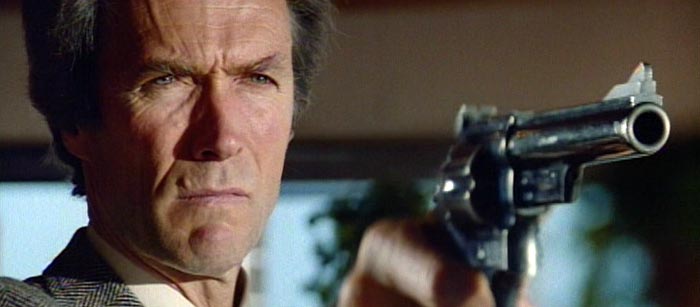“No one is Above The Law…”
“No one is above the law,” says Steven Seagal in the aptly named Above The Law, but looking around the world, this is obviously not the case. There are people above the law, namely the police themselves, and police acting above their station can be seen all the way from Ferguson to Indonesia to Warwick Campus. But this comes to me as no surprise. Looking at cop movies, this has always been the case, where there is ample evidence of undue brutality, corruption and even cold-blooded murder. Some of these movies are great, some not so great, but a general overview shows that police fascism has embedded itself so much into our culture, that seeing it happen somewhere like Warwick Uni makes kind of sense. It’s there every time we turn on the TV. The modern cop movie which came to life in the seventies – gritty, urban and filled with violence – has two clear antecedents, Film Noir and the Western, therefore combining a murky moral worldview with the simple archetype of a big man with a big gun. In fact, the first superstar cop started his career in Westerns: Clint Eastwood.
In Dirty Harry, we see a man whose view of justice involves the end justifying the means. The reason he gains our sympathy for acting above what he would call “bureaucracy” is that he looks so goddamn cool doing it. There were times when I was younger that I actually thought about being a cop. I mean, you get to solve cases and wear a gun. But then I remembered I lived in the UK and would have to go on the beat for two years before being a detective which actually sounds really boring.
…the high prevalence of the same type of movie being made again and again shows that these methods aren’t a total fantasy…
Anyway, as Roger Ebert writes on the pleasure brought from the Dirty Harry series, “To all those cowboy movies we saw in our youth, all those TV Westerns and cop dramas and war movies, Dirty Harry has brought a great simplification: a big man, a big gun, a bad guy and instant justice.” Here you see the threat quickly neutralised, never to trouble society again. It’s beautifully simple, but that doesn’t mean his methods aren’t highly problematic. As Film Noir went revisionist, showing traditional detectives in the vein of Philip Marlowe out of their depth in Chinatown, Night Moves, and Farewell, my Lovely, Western-style Police fascism reached its greatest heights in the 80’s with films such as James Woods’ ultra-ironic Cop and Stallone’s nihilistic Cobra. As Stallone himself says before blasting another victim, “You’re the disease, and I’m the cure.” His character is called Marion Cobretti, Marion being John Wayne’s real first name.
That’s not a coincidence. These films are undeniably entertaining, but we shouldn’t really be admiring these ultra-violent cops. Additionally, in this world of hyper-masculinity, these men have problems sustaining relationships with women, a byproduct of their unsettling worldview. They’re anything but positive role-models. The nineties carried on this tradition with films such as Internal Affairs, Richard Gere not being above planting a gun next to the man he just murdered, Bad Lieutenant, where Harvey Keitel takes a load of cocaine, fucks a load of hookers, and jerks off while orally abusing young girls, and Cop Land, in which Harvey Keitel and other distinguished Italian-American actors play cops who use their untouchable power to make money through mob connections. Both Gere and Keitel act in these roles with incredible arrogance, the type which only comes through abusing a position of trust. This arrogance carries on through the 2000’s in Training Day, Harsh Times, and Street Kings. All these cops are played by movie stars (Denzel Washington, Christian Bale, and Keanu Reeves respectively) and this adds to their high likability. However, when this “shoot-first-ask-questions-later” or “let’s-tear-gas-this-kid” approach happens in real life, it is no longer cool, it’s horrific. But the high prevalence of the same type of movie being made again and again shows that these methods aren’t a total fantasy, but actually appear quite popular in modern society as both entertainment and as modes of enforcement.
The same can be seen in modern British films too. Take Blitz for example, starring Jason Statham in the Dirty Harry role. As the film starts, some kids are robbing his car. Instead of arresting them himself, or requesting back-up, he takes matters into his own hands. He proceeds to beat the shit out of all of them with a baseball bat. Blitz is a pretty average knock-off of the genre, despite Statham’s hilarious presence, but it shows that unjust policing is also an English and a universal problem too. Not that the police use baseball bats. Obviously, I’m not saying that these movies cause cops to be violent, rather that they are a useful way of seeing that bad policing has had a long history in our society and is reflected through film.
Some policemen believe that they can get away with anything because they are the law, and are therefore above the law. But no one is above the law. Just ask Steven Seagal.


Comments